 | « Back to article | Print this article |
Amitabh Bachchan turns 75 on October 11.
Rediff.com celebrates the superstar with this special series, looking back at the very things that made him the BIG B.
We first published this special in November 2009.
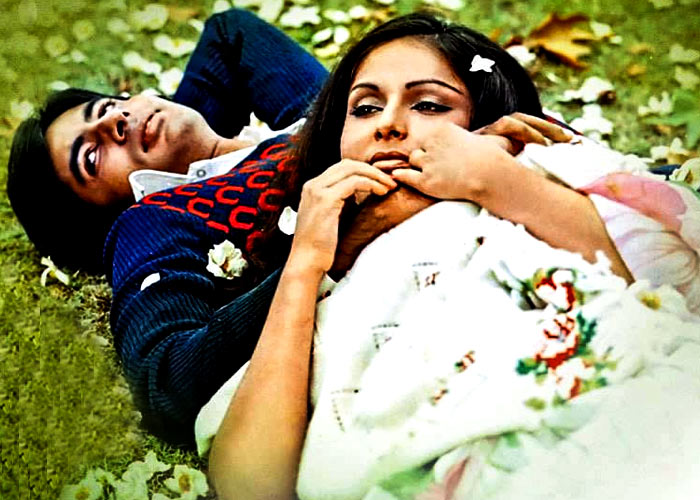
There are actors, and there are stars, and there are those who end up dwarfing the industry they are a part of.
But there's only one Amitabh Bachchan.
As we wish him the very best, with lots more years of entertainment to come, here's a fanboy present to the legend himself: An A-Z of Bachchanalia, the letters expanding into unforgettable bits of his filmography.
We wish you a very happy birthday, Amitji. Thank you for the magic.
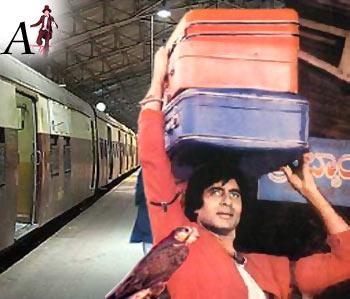
A Allah Rakha
Amitabh Bachchan's Iqbal Khan was a pretty spectacular porter, a scarlet-shirted suitcase-bearer who led the cult of coolies as he proudly wore his divinely numbered ID bracelet 786.
Yet, what truly made this Manmohan Desai character iconic was his pet falcon, Allah Rakha.
A majestic bird, he was a constant ally who came to Bachchan's rescue in the film.
Later, when Amitabh was injured after an on-set accident that brought the country to its knees, he recovered and came back better than ever. Allah Rakha indeed.
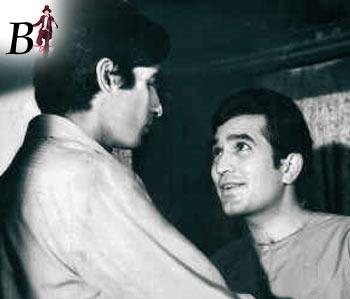
B Babumoshai
Hrishikesh Mukherjee's 1971 classic, Anand, was a breakthrough film for Bachchan, playing no-nonsense doctor, Bhaskar Banerjee.
Not just did Bachchan's baritone bestow unforgettability on the kind of cancer Rajesh Khanna's titular character had -- lymphosarcoma of the intestine -- but his Babumoshai was a wonderfully written character and brought Bachchan's sensitivity to the fore.
The honourary Bengaliness Hrishida conferred upon him started here and remains a vital part of the Bachchan persona.
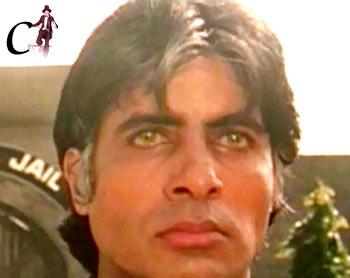 C Contact lenses
C Contact lenses
He had to be Sunday.
In Raj Sippy's delightful take on Seven Brides For Seven Brothers called Satte Pe Satta, each of the brothers was a day of the week.
And while Amitabh was in top form as he played Ravi, the eldest, he truly shone in the role of his doppelganger, Babu.
The sinister RD Burman theme would kick in soon as dashingly-greying Babu would appear on the scene, and his Ravi act would include slipping on dark contact lenses to cover his own cold light eyes.
Do keep in mind that this was 1982, and this was the first time most of us had even seen coloured lenses.
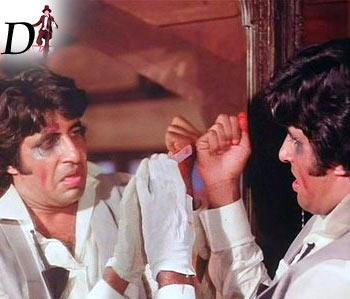
D Drunk
It is an incredibly hard feat to master the drunken slur and even make it sound poetic, but Bachchan poured that silken voice and all his charisma into his hiccups, and no boor was ever more charming.
The immortal band-aid scene from Amar Akbar Anthony is a masterful soliloquy, while the cockroach exposition from Hum is astonishingly effective.
Just when you think he'll stop, he goes on -- and he makes it work.
This is a man who taught us, in a Golmaal cameo, that a hurricane isn't excuse enough to spill a drop of drink -- all the while making the usually coarse word 'sharaab' sound smooth as single malt.
Cheers.
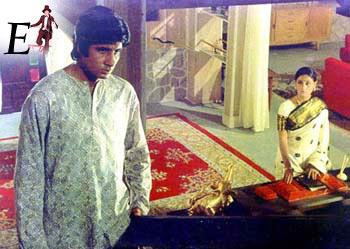
E Ego
Hrishikesh Mukherjee's 1971 film Abhimaan starring Bachchan alongside wife Jaya is their finest work together.
Amitabh's Subir is a singing star who marries Jaya's Uma, a wonderful amateur singer.
As Subir's star dims and Uma's ascends, envy rears its hideous head and ego tears the couple apart -- even as SD Burman's soundtrack keeps things ironically lovely.
Jaya racked up justly-deserved plaudits but Abhimaan sees Amitabh deliver a magnificent performance as a protagonist riddled with insecurity and arrogance.
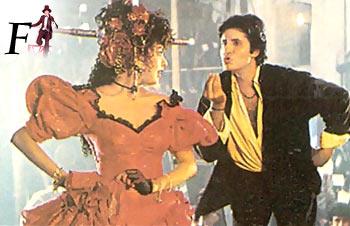
F Friday
Not just is an Amitabh Bachchan Friday the biggest kind in an industry running from Friday to Friday, but one has to doff a hat towards a 49-year old Bachchan puckering his lips and thrusting out his pelvis while leading a chorus of beermugs.
The way the Big B set about asking for his promised Friday kiss sparked off a sensation and, thanks to Mukul Anand's Hum, a grizzled Bachchan showed us why an Angry Man doesn't need to be young.
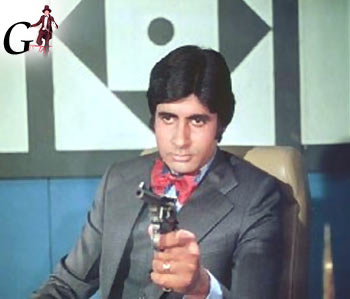
G 'Gyarah mulkon ki police...'
Cops from nearly a dozen countries were on the lookout for Don, but capturing him wasn't just difficult, it was impossible.
Amitabh Bachchan took his image to whole new heights of coolth with Chandra Barot's 1978 smash hit.
Bachchan juggled Vijay the bumpkin and Don the gangster with equal aplomb, and even over two decades later, it's hard to think of a more suave leading man.
And as the Shah Rukh film proved a couple of years ago, it's not just hard to remake Bachchan, it's inconceivable.
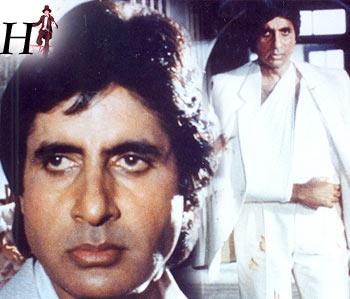
H 'Haain'
In the way that Sir Sean Connery gradually started sh-ing his esses as age and his Scottish lineage got the better of him, a large part of Bachchan's 1980s/90s oeuvre saw him in roles making the most of his 'Ganga-kinaare waala' roots.
The actor developed a characteristic 'haain?' sound, one that he tacked on to the end of his sentences for emphasis, best heard in Agneepath.
It's a dramatically growled sound, the ill-tempered father of a 'huh?' squeak, and no one does it like Amitabh -- even though it's the first thing mimicry artists mock.
Yet, he made a syllable and a half into a trademark that amuses the entire nation.
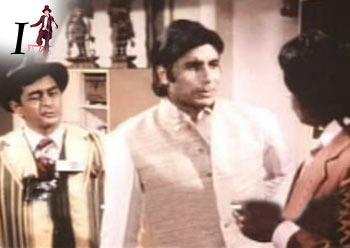
I 'I can walk English'
Namak Halaal is the kind of film that would be utterly unwatchable tripe without the leading man.
The script gives Bachchan nothing to work with, forces him to keep saying 'daddu' in a pained wail, and tosses in a song ripping off Peter Sellers and another involving an unnecessary dance in all-too-fake rain.
Yet it was Bachchan, and he elevated this bawdy Prakash Mehra film to classic status with incredible comic timing and phenomenal screen presence.
It was 1982, and such a peak had Bachchan scaled that Francois Truffaut had dubbed him a one-man industry.
Not just could he walk English -- invoking Byron, Vijay Hazare and two cricket matches in the same breath -- but he could also trip the light fantastic.
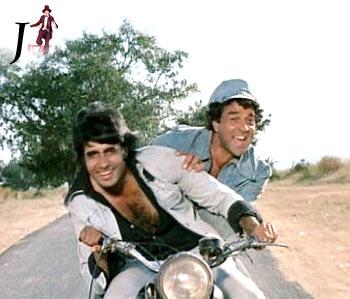
J Jai
Conventional industry wisdom marks Dharmendra's Veeru clearly as the hero of Sholay, the biggest Hindi film of all time.
He gets the maximum amount of screentime, all the indulgent moments of horseplay, the heroine with the smartmouth and stays alive at the end.
Yet, it is Bachchan's Jai who brings a magical unflappability to the proceedings.
He's the man's man, the one with nothing to prove who sits back with his hat pulled over his eyes, his sharpshooter perfectly aimed, occasionally flashing a wicked sense of humour.
Just don't challenge him to a coin toss.
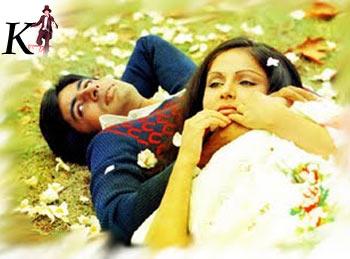
K 'Kabhi Kabhi Mere Dil Mein...'
That voice was made for goosepimples.
Mukesh sang the lighter version of the song, Lata brought incredible poignance to her heartbreaking reprise, but Bachchan did it best.
Laying lover in lap, he recites Sahir Ludhianvi's ethereal words in that voice, that staggeringly perfect voice, and makes the moment last well beyond the film.
Bachchan started his career by playing commentator in Mrinal Sen's Bhuvan Shome, and it's no wonder Satyajit Ray honed in on him to do the same for Shatranj Ke Khiladi.
The voice has inevitably changed -- though it retains its distinctive character -- but one listen of Kabhi Kabhi brings it all back.
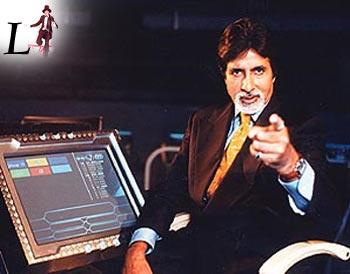
L 'Lock kar kiya jaaye?'
At the turn of the 21st century, it seemed as if Bachchan and Hindi cinema had outgrown one another.
It was at this stage that the actor decided to host a game show, an idea perplexing to many.
How could a simple quiz show be an appropriate vehicle for the biggest star in our cinematic firmament, one who shunned television for so long?
Well, it was.
Bachchan emptied streets of traffic as he cajoled answers out of contestants, making his way with a beguiling smile and Hindi so immaculate it sparkled.
The reinvention was incredible, and we now began to relate to Bachchan on an irresistibly familiar level.
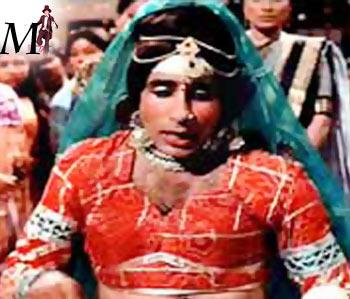
M 'Mere angane mein'
It is one of Prakash Mehra's most unashamedly capitalist movies, marking the leading man as illegitimate and calculated to pander to middle-India sympathies.
And yet, with the unfathomable whimsy that made cinema of that era special, Laawaris is interrupted by a hilariously sexist song featuring Bachchan in many kinds of drag.
Making for a singularly ugly bunch of women, Bachchan carries off the song with elan, making it one of his most memorable excursions behind the microphone.
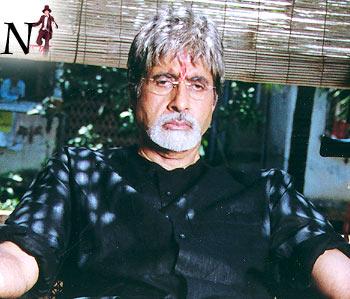
N Nagre
At the time Ram Gopal Varma launched into his ambitious Godfather remake, Amitabh Bachchan had settled into a comfortable groove playing father roles (mostly to Akshay Kumar) and generally finding his niche as a grizzled old character actor.
Ramu was having none of that, deciding that The B is far too Big for life.
Subhash Nagre might have been based vaguely on a certain Maharashtrian politician, but the fire Bachchan breathed into the character was all him -- and showed us that a dragon can roar any time he pleases.
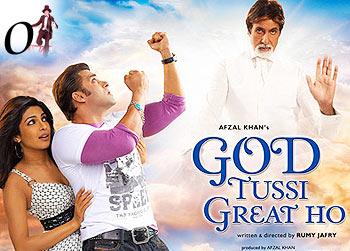
O Omnipresent
Not just is he absolutely everywhere when it comes to cable television options on any given night, but Bachchan is deified by the nation, put on a pedestal even the Divine can't regularly clamber upon.
Until a few years ago, there was a regular system of darshans outside the actor's Juhu bungalow.
It's no surprise that he of the booming baritone is now frequently called in to play or voice the Almighty, doing so for films like Hello Brother, Agni Varsha and God Tussi Great Ho.
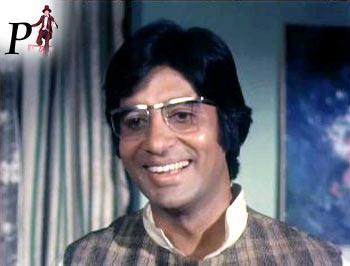
P Professor
A lanky, diffident fellow with an unmistakably bookish air, vintage Bachchan was a perfect on-screen fit for academic garb, and he memorably played a professor in both his most acclaimed recent role as well as his best performance of all time.
Bachchan won a National Award for playing Debraj Sahai in Black, but his best-ever acting job was in supporting garb as Sukumar Sinha in Chupke Chupke.
Furiously fingering fake glasses that refuse to stay in place, Bachchan's Literature professor pretends to be a Botany professor and strikes absolute comic gold.
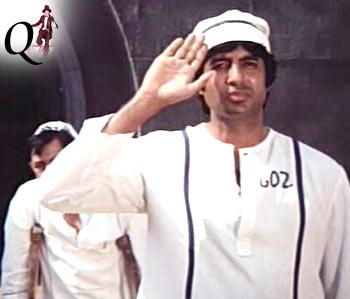
Q Queue, as in The Line Starts Here
It's a loose translation of Amitabh's famous Kaalia line, 'hum jahan pe khade ho jaate hain, line wahin se shuru hoti hai,' but things indeed start wherever Bachchan stands.
He was a trendsetting star in every way, from spawning generations of angrier young men to taking on different genres and mediums.
For a long time film magazine ratings featured Bachchan as the top 10 with other heroes coming in only at 11, and even now every actor worth his crores is taking on TV only after Bachchan's made it the biggest thing around.
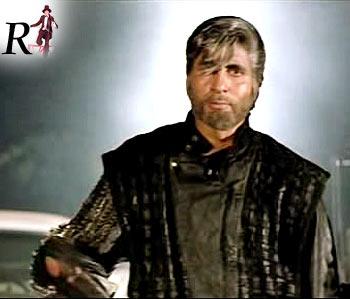
R 'Rishtein mein toh hum...'
For his late-80s comeback, Amitabh Bachchan let wife Jaya write a story and -- while this involved a bizarre asthmatic vigilante with a chainmail arm -- totally committed to the cause, and Shahenshah not just rocked the box office but remains memorably iconic to this day.
It's hard to pull off a superhero in a land where all heroes can bash 12 baddies by default.
But Bachchan brought his own blend of hard-hitting sinister and complete alter-ego tomfoolery to the part.
The result?
The most memorable who's-your-daddy hero Hindi cinema's ever known.
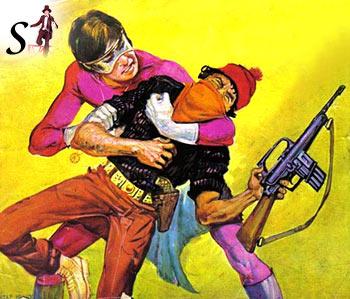
S Supremo
Spiderman is really Peter Parker, Batman is really Bruce Wayne. Star Comics, an India Book House subsidiary, just went one step further as they created a masked crime-fighting hero called Supremo -- and his harmless alter ego just happened to be Amitabh Bachchan, actor.
The artwork was pretty good, and while Mr Bachchan didn't go as far as wearing his underwear on the outside, he had a falcon called Shaheen and Robin-style sidekicks Anthony and Vijay.
With Gulzar as scripting consultant, the comics were a fantastic, albeit tragically shortlived ride.
The kind of ride only Bachchan, with his persona and his ouevre, could take us on.
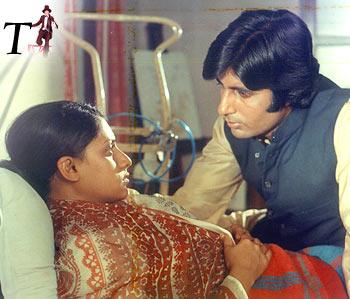
T Telescope
One of Bachchan's most brooding performances came in Hrishikesh Mukherjee's Mili, where the actor played Shekhar Dayal, a recluse who liked nothing better than his whiskey on ice and lots of alone time to observe the stars.
Bachchan was a revelation in the role of a scowling, irritable drunkard while wife Jaya played the titular Mili who brought a smile to his otherwise gruff lips.
One of the few films that captured his poetically melancholy side, Mili captured Amitabh at his most darkly appealing.
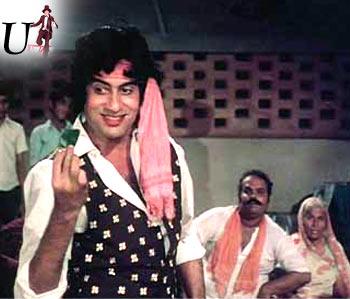
U UP
Son of famed poet Harivansh Rai Bachchan and Teji Bachchan, Amitabh proudly basked in his Uttar Pradesh roots.
The Allahabad-schooled lad was famously referred to as the boy from the banks of the Ganges, the 'chhora Ganga kinare wala,' in the iconic Don song, Khaike Paan Banaras Wala, and his political forays have all been from the state.
He frequently played characters from the heartland, and often sported the last name Srivastava -- his own factual name.
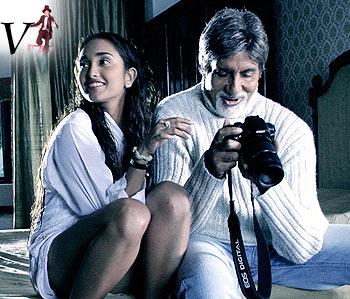
V Vijay
What can you say, the name just stuck.
Till today, the name Vijay instantly evokes 1970s-tinged memories of a tall man with a long nose and longer sideburns, a flared collar spread wide open, and a hand already coiled into a fist.
Amitabh has played 19 Vijay's over the years, starting from 1973's Zanjeer right up to 2007's Nishabd.
The name came to be synonymous with Bachchan's furied on-screen persona, never more than when he unforgettably hissed it out (always accompanied by the rest of his on-screen name, Dinanath Chauhan) in Agneepath.
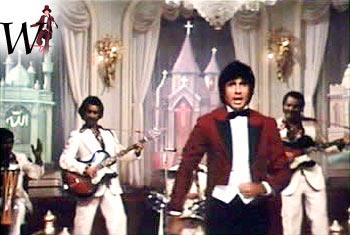
W Waiter
Twenty-five years before Vikas Swarup christened his Q&A protagonist Ram Mohammad Thomas and Farah Khan brought on a songful of cameos in Om Shanti Om, Bachchan did it all with the spectacularly star-studded John Jaani Janardan in Manmohan Desai's Naseeb.
Bachchan played a waiter with great elan, sure, but true to form there was more to be done than just a regular job: Johnny was movie-lovin' waiter by day (and night), and hardcore steelcage-fighter into the wee hours of the morning.
No wonder he had crooners swooning.
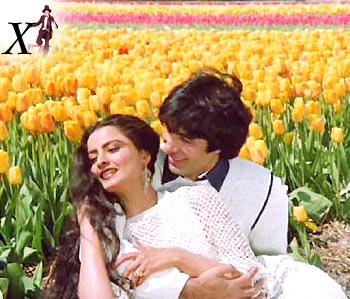
X Madam X
No, of course Amitabh didn't star in the disastrous 1994 film.
Who did, however, was the leading lady he shared more than a dozen hits with, one who fuelled both magazine-selling gossip and celluloid-melting chemistry.
She was the mystery ingredient, the X factor that made him even bigger than he was, and no discussion of his cinema is complete without the one woman who was more than content merely emulating him in every way.
This 1994 fiasco was Rekha's remake of Bachchan's Don -- a cinematic failure perhaps, but as touching as tributes come.
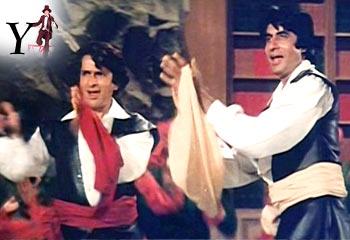
Y Yamma Yamma
Shaan, which featured that insanely fun song, is an unbelievable film.
Directed by Ramesh Sippy with much fanfare after his industry-shaking Sholay, the film had Amitabh and Shashi Kapoor as conmen, Kulbhushan Kharbanda as an egg-headed Bond-villain wannabe called Shakaal, and gave us immortally bizarre sequences such as Sunil Dutt being chased to death by scores of positively adorable beagle puppies.
It's hard to conceive just what the film's writers were on, but Amitabh was in tremendous fettle as he, through all that camp and cheese, grinned -- cheekily enough for us to bear it.
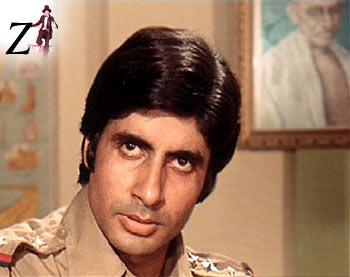
Z Zanjeer
It should be made mandatory for police stations across the nation to have on their walls, right next to the ubiquitous portraits of the Mahatma, a framed photograph of Amitabh Bachchan's Inspector Vijay Khanna.
Pran's hand rests on a chair and Bachchan swiftly plants an epochal kick on it, that single moment birthing the Angry Young Man persona set to dominate Indian cinema for decades.
Prakash Mehra's 1973 classic Zanjeer sees Bachchan at his glowering, seething, action hero best, and he's so bloody inflammable the screen is fit to burst.
Those legs are long and meant for fighting, that baritone takes on cold ruthlessness, and his eyes are tinderboxes.
Awesome.